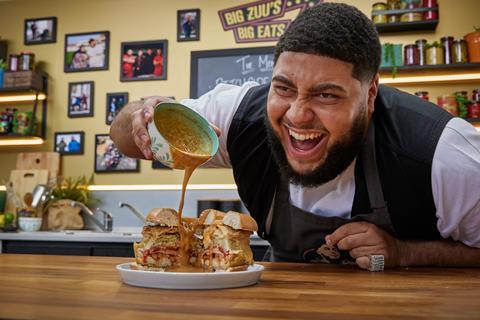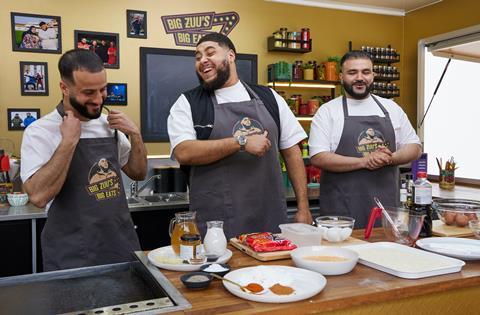Big Zuu: Hitting the big time (original) (raw)
The grime star and TV chef is bringing fresh flavour to the food-travel genre with 12 Dishes In 12 Hours for ITV1, his first primetime show on a terrestrial channel
When asked if he feels like he’s “made it”, Big Zuu laughs. He’s fresh from filming the first week of his highest-profile series yet – Twofour and Big Productions’ 12 Dishes In 12 Hours for ITV1 – when he speaks to Broadcast, and what he’s realised, he says, is that he is no “traditional chef”. And that is exactly how he wants it to be.
The move to an ITV1 primetime slot is certainly new territory for the grime artist and TV cook, who also fronts the Bafta and Broadcast Award-winning Big Zuu’s Big Eats on UKTV channel Dave, and he hopes to use his comedic flair to bring his distinctive flavour to the food travelogue (see box, below).

Big Zuu Big Eats
Traditionally, major broadcasters have tended to work with more mainstream professional chefs. ITV’s previous forays into the genre have included Gordon, Gino & Fred and John & Lisa’s Food Trip Down Under, with husband and wife duo John Torode and Lisa Faulkner.
But Zuu hopes this point of difference will secure the younger demographic of viewers that he reached with Big Eats.
“This is a different place from Dave, so the reaction to the show will be different, but I think what we represent will shine through,” he says.
“ITV is willing to tap into a younger voice for something traditionally given to an older person and it’s brilliant to interact with people on this series: coming to another country and speaking slang and being the brother that I am, when they’re probably expecting a [more traditional] chef to walk in – it’s sick to see that love of food connecting us both.”

Sharmarke Abdi
That’s what 12 Dishes leads with, he says – “the right conversations, and a love of food”.
Throughout the interview, Zuu expresses enormous gratitude for opportunities he has been given in his career, but says its vital that the industry broadens its talent pool by “opening the doors to different people”.
This is also the founding principle of his newly unveiled indie, Big Productions, which recently secured a major development deal with Banijay UK.
Under the deal, the production and distribution giant will help develop and produce comedy and factual entertainment formats with Zuu, backed by funding from the super-indie’s £50m UK growth fund, as well as benefiting from partnerships with other Banijay labels.
He’s keen for his indie to deliver authentic representation of different places and their street food, through shows such as 12 Dishes. And he’s hopeful that over the next few years, it can deliver three or four co-pro shows featuring diverse crews and fronted by himself, before moving on to the challenge of producing content with other on-screen talent.
“We’re on course to give a lot of people jobs – the numbers will keep rising,” he says.
Described by Banijay UK chief executive Patrick Holland as a “once-in-a-generation talent”, Zuu is now eager to bring in new faces with transferable skills from adjacent industries.
“A big part of the Banijay deal for me was being able to bring in new talent through their ecosystem, and nurture people into the game the way others have done for me.” He says he is hoping to “teach them things I didn’t know when I was coming through”.
Online talent
One of TV’s shortcomings, Zuu says, is the unwillingness among commissioners and executives to invest in YouTubers and social media stars – “people who have incredible engagement online but are rarely considered for shows”.
“We need to give a voice to a new generation,” he says. “They need a chance on television and I feel that this deal with Banijay UK is a small part of adding to that.”

Big Zuu Big Eats
This focus on giving opportunities is not just about on-screen talent, however, with Zuu eager to give opportunities to crew as well. On Big Zuu’s Big Eats, the production company employed Ashleigh Jadee, a black female director, which Zuu says “is not something that happens as often as it should”.
It was Jadee’s first TV credit, having worked with Zuu previously on music videos. Her success, he says, is proof that a willingness to give people roles they might not have direct experience in can be rewarded. “TV execs need to have that forward thinking to consider where the industry should be growing,” says Zuu.
Zuu himself began his TV career online, with Snapchat cooking clips leading to a pilot and then the first series of his now Bafta-winning UKTV show, Big Zuu’s Big Eats. This is something he says he could not have done without the support of mentors and champions in the industry.

Natalie Rose
He references 12 Dishes commissioner Natalie Rose, who has supported him since the beginning of his television journey, ordering the pilot and subsequent debut series of Big Eats on Dave when she worked as a commissioner there.
“The fact that Natalie Rose is a black woman in commissioning is incredibly important,” he reflects. “The industry is trying to change and give people from more diverse backgrounds positions of power, but there still needs to be further change in representation.”
Zuu says Rose’s support has been crucial to him and his team. “Not only did she believe in us and give us that first commission, but she always put her best e ort into it and loved the show – not all commissioners do that. She championed and elevated me, which is why I gave her so much love in my Bafta speech.”
During that Bafta speech, following his win in 2022, Zuu also highlighted the “humble beginnings” of himself and his co-stars (Zuu’s mother moved to the UK from Sierra Leone during the country’s civil war while pregnant with him). He quipped that young people watching at home should think “if these wastemen can win a Bafta, surely we can”.
He says that while his TV career has grown exponentially, he’s still working with many of the people who nurtured him from the start. For instance, he first met Alex Gilman on Big Eats, where he worked as a producer for Boom. Now Gilman serves as creative director and executive producer at Big Productions and continues to work on the show with Zuu.
“When I’m championing change and talking about wanting different people in the industry, it’s not the case that I don’t want to work with white men,” Zuu says. “If I wasn’t able to work with someone like Alex I’d not be able to do what I’ve done, but we need more people like Natalie Rose in the game.”
“What I want is for Big Productions to be an advocate for change in the industry”
He adds that “the more different views you can have in a crew, the greater the thing you can create”. “I’m very lucky in terms of the way I’ve been able to grow in my role,” he says. “ITV gave me a breakfast show and that gave me the touch and feel for ITV, and now they’ve entrusted me with a primetime role.”
So does Big Zuu he feel he’s made it? “What I want is for Big Productions to be an advocate for change in the industry, and to make content that makes people laugh and smile. Once we’ve done that for a couple of years and established ourselves, then I can say I’ve made it.”
MAKING 12 DISHES IN 12 Hours
In each episode of 12 Dishes In 12 Hours, Zuu travels around Europe with guests ranging from high-profile actors to sports stars. The pair sample a dozen dishes in each location, exploring the place through its local delicacies.
One guest, a high-profile sports player with whom Zuu visits London foodie hotspots, said he viewed London “in a different light” after filming.
“That’s exactly what we want to do with this show,” says Zuu. “Every place we go, we want to rediscover that region and see it from a different lens. That lens is my view, taking in my background and where I come from, as well as the guests’, and the different types of food we can taste within that region.”
Zuu was eager to focus on the intertwining of different cultures in specific regions and how migration can be represented through food.
In one episode of 12 Dishes, he and a guest travel to Bologna, where they sample some Ethiopian and Eritrean food, as many of the city’s residents are of East African descent.
“It’s about getting that balance of the really interesting things about food in terms of its history, but also reflecting where it is now – the street food, what’s popular right now,” he says.
“I never really cared about where this parmesan originates from and how long it was aged for – that wasn’t my background. I cared about whether it tasted good, but I’ve been able to enjoy a balance of fine dining and that street level experience where you’ve got one Italian Nonna running a restaurant.”